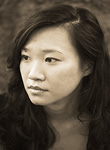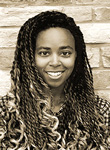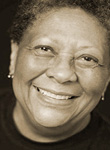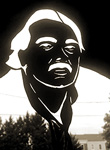This fall marks Blackbird’s eighteenth Levis Remembered, which calls attention to the work of Larry Levis and recognizes Jenny Xie, winner of the twenty-second annual Levis Reading Prize.
Included in this year’s reading loop is Levis’s poem “Fish,” a piece that recalls a brusque and jolting encounter with authority and that hints at many of the autobiographical and narrative preoccupations that take center stage in Levis’s later work.
In examining these concerns, Gregory Donovan’s accompanying essay, “Caught: The Fish in Bishop, Dubie, and Larry Levis,” addresses this particular image as it dominates a poem by each poet. Donovan’s essay comments on “a terror that keeps echoing” and how the poems address “the vast, unfathomable nature of our human existence.”
Also included in the reading loop is an essay by Christopher Buckley remembering Levis as a fellow Fresno poet and student of Philip Levine and Levis-inspired artwork from Richmond street artist, Larry Lorca.
Xie herself is represented by three poems from her prize-winning collection, Eye Level, and an audio conversation about her work and process. A review of her book by Emilia Phillips also appears here.
In “Phnom Penh Diptych: Dry Season,” Xie declares “I’ve gotten to where I am by dint of my poor eyesight,” and this constant seeking of answers and knowledge by means of sight permeates her poems. As Phillips notes, “By seeing, one immediately gestures toward the divide between the gazer and the subject of their sight, the self and the Other.”
To lead off the offerings in Poetry, Dilruba Ahmed asks “Tell me why / the texts on grief / suggest sequence / instead of repetition,” a question that sets a tone for the entire issue by investigating the particularly untethered nature of our moment. She does not hesitate to point us to “ . . . rocks / that crack at the slightest touch / into impossible geometries.”
In the poem “Arrow,” Sumita Chakraborty poses her own question: “Was it I who invaded the day, or the day who invaded me?” The dichotomies she probes also seep into “Essay on the Order of Time,” a poem declaring that “Here, the argument is that death requires the most discrete borders of all things, and that there is a clear order to how it functions as an event in time.”
Michael Chitwood’s “First Loss,” delves into the complexity of grief through fragments of memory, sensation, and “stories . . . / not all angelic.” “What did I really know / about you?” asks a speaker who has opted for normalcy in the moment, who “chose school / instead of the funeral.” Nevertheless, loss lingers into the present: “Sometimes I smell your cigarettes / and hear the pack crackle in its cellophane.”
William Logan’s two poems, “En Plein Air” and “Daumier, Man on a Rope” examine the paradoxical nature of living and art, all those “lost in the nowhere / that is life and the nowhere not.” These moments of stillness are transient, “wandering the trackless past,” and include an old house wondering: “How long / before the brick unsaid itself.”
In a poem directed much more at our own moment, Amber McBride’s “For Colored Kids Building Up Their Bones” urges those children to “push them till they break, baby,” even in the face of “bones [that] are tired” or the “gun [that] gets away.”
Evoking a much more personal landscape, Rainie Oet’s translations of early twentieth-century Russian poet Sophia Parnok bring together an awareness of the speaker’s “other self,” how it “drifts through a wasteland” and reaches its peak when “in a crazy, magic fire I burn up my own twilight!”
Catie Rosemurgy’s “Diorama” sequence creates a scenic, at times haunting, depiction of “a town that forms from wear like a blister . . . curled up, kicking inside the countryside, / ready to be born.” These terse scenes describe “a disaster left off the list of disasters; / a disaster that shines when polished and set out on a tray with other disasters; / a disaster that flips a switch and turns on other disasters.”
Traversing time from the modern “Great Pacific Garbage Patch” to a “scroll of parchment” quoting a book from 1657, Cherene Sherrod’s “The Turtle Cure” explores the devastating impact of humans on the environment: “from Barbados to Liverpool / no turtle went uncastrated.” The poem also offers a hope of nature’s ultimate victory or revenge: “after the Vieux Carré is / drowned by rising waters Loggerheads will reclaim the culinary institution’s tablecloths.”
In “Finding Other Uses on Earth,” Alison Stine’s speaker pines for a lost autonomy, saying “I want those years back, years in which I never / knew you.” Stine’s poem juxtaposes this speaker with horseshoe crabs and uses them both to explore loss in natural and man-made contexts.
Svetlana Turetskaya’s “Swan Lake with Dostoevsky,” collapses time and medium to illustrate the transformative power of art. The speaker watches an old Swan Lake on “Youtube, in black and white, on [her] iPhone 6,” blending 1965 into the present “when Rudolf dances with Margot,” only to shift gears into the implicit violence of Crime and Punishment.
Studded with images of grief and deceptions, Kathleen Winter’s poems aim to find the language to express some of the complexities of Ireland’s troubled history. In “Trespass” the poet explores this past with a focus that seeks to answer questions dealing directly with grieving a death “one never knew” where the “Cemetery’s full/ of the flock who left on someone, something else’s clock.”
In a poem that drives through vivid landscapes of “Roses / spill[ing] off porches / . . . Mufflers weep[ing]” and “houses / built back when trains / were still built downtown.” Annie Woodford’s “Great Road” travels “the deep-green continent,” of a town still suffering a deep decline.
Rounding out the offerings in Poetry, Maya Jewell Zeller provides poems that playfully and profoundly destabilize the familiar.“We hurtle toward ourselves, the children gasping,” she writes in “Benediction Remembering Sunrise and Fawn, with a Trip to the Planetarium.” For her, perspective is everything: “from here it looks different . . . like a bone spur or some madness I found glimmering when hope was still a boat on a horizon . . .”
In Fiction, Caroline Casper’s “Women in Tech” follows a journalist assigned to profile a female performance artist who after injury in a car crash implants a video camera in her prosthetic eye, an action that calls into question how technology interfaces with how and what we see. “Concerned only with all the ways we might be perceived, we ignored everything else and recorded each other,” the narrator comments.
In “Under the North,” Robert Froese relies on precise and expressive language to limn a couple trying to navigate a dystopian future irrevocably altered: “The region where the couple lived was known for the scarcity, the preciousness of light. There seemed at times not even to be such a thing as light, only a world in which things somehow were grayly visible.”
Elmo Lum’s story, “Dearth, Famine, Want,” depicts portrayals of realization, belief, discovery, and language through an unusual narrative that subverts expectations, leaving “more at a loss. With every second, the universe dims.” “This is why people believe,” he seems to conclude, “Believing is what holds the wolves from the door.”
Marilyn Nelson continues her translation from the Danish of the late Inge Pederson’s fiction with “The Apple,” a second installment from an unpublished novel. Here, the narrator takes off for college, leaving her childhood “standing long and white and empty in front” of her, and crosses into a new, unknown life.
Kate Tighe-Pigott’s short story, “Postcard,” takes on the familiar territory of love and its complications, and she opens the story with a particular urgency: “After the miscarriage, the Alaskan and I decide gravely to get married.” What follows brims with anger, violence, and grief, “hang[ing] all around us like moisture.” Tighe-Pigott doesn’t seek to answer all love’s probing concerns, but instead offers an incomplete, yet potent, redemption.
In Nonfiction, Hal Crowther offers a scathing indictment of the impact of technology on the mental health of our young people, particularly college students. Drawing inspiration from Sven Birketts and Oliver Sacks, as well as his own experiences, he implores us to consider the long-term ramifications on our society that this relationship with our devices portends.
Also appearing is a third episode from the late Wesley Gibson’s You Are Here: A Memoir of Arrival, originally published by Back Bay Books in 2004. Recounting his move from Richmond to New York City, Gibson travels through memories with wit and unflinching descriptions. In this excerpt, Gibson grows into his queerness, recounting the hardships of finding a community where, in an era still shadowed by the AIDS epidemic, “Death, its omnipresence, feels as visceral as a black dog growling under the couch, waiting to bite.”
Rose McLarney’s “Blue Prints” studies intimate family letters as a way to understand “the implications of aging and change.” As she traverses family homes and landscapes, McLarney deploys her upfront and alluring prose in an attempt to fit together “the gaping blanks” to these letters that only provide “Details, but not all the story.”
Jessie van Eerden uses her essay “Meet You at the Dollar General Across from the Family Dollar” as a vehicle for investigating the “prayer of healing even as you die your death.” Van Eerden looks toward being “touched a thousand ways by the waking prayers,” and conjures Jean Vanier to bridge the gap in the world van Eerden creates and the one yearned for “as a gift.”
Reviews by Chelsea Gillenwater and Brandie Gray of new books by Yoko Ogawa and Paige Ackerson-Kiely complete the section.
In Gallery, Jason Grote’s play, Civilization (All You Can Eat), provides a darkly humorous critique of American political discourse through characters connected tenuously by family, work, and love. Grote follows them through career changes and tumultuous relationships as Big Hog—a grotesque embodiment of capitalism and consumerism—looms behind and ultimately overtakes them. Notes from the playwright and the directors of recent productions accompany the text.
The 1918 Suite, “Enough of us Still and Brave Enough,” continued from v17n2 and v18n1, collects additional testimony to the consequences of the influenza pandemic in the early years of the last century. Featured is Voices of 1918, composer Kenneth Langer’s setting of a number of poems from Ellen Bryant Voigt’s Kyrie for a performance by the Vermont Symphony Orchestra in the year 2000. Other text comes from accounts written near the time of the pandemic by such diverse individuals as a Scottish pacifist and architect, a British journalist and undercover propaganda agent based in Norway, a Canadian editor and humorist, and a French WW1 soldier and war translator who became a journalist and editor.
In features, Lina María Ferreira Cabeza-Vanegas discusses her project 100 Refutations—a collection of poetry translations serially published in The Brooklyn Rail. The project is a literary response to President Trump’s January 11, 2018, dismissal of foreign nations as “shithole countries.” In an act of devotion, celebration, and protest, Ferreira reacts by curating, translating, and preserving the work of writers—one daily for 100 days—“from one of the countries recently denigrated by the president of the United States.” Blackbird also offers our chronologically ordered table of contents linking to each of the 100 Refutations—and associated essays by Ferreira—published between April and July of 2018 at The Brooklyn Rail.
“A Conversation with Jessie van Eerden” gives us, among other topics, her take on narrative voice, regional identity, the ethics and opportunities of portraiture in literary nonfiction, and specifically, the challenge of writing the “other.”
A VCU-hosted reading by poet Ada Limón also appears. Closing Features is audio of Charles Wright speaking at the University of William & Mary on February 15, 2019, where he read from various collections of his poetry, spanning more than fifty years of writing. ![]()
Return to top menus | Browse issue























